Two new research groups at the OCCR
The Oeschger Centre keeps growing. Albert Hafner and Claus Beisbart have been co-operating with the OCCR as adjunct researchers, and have now become full members of our network. Albert Hafner is leading the Prehistory Archeology research group. Among his current research projects include “Mobilities, entanglements and transformations in Neolithic societies on the Swiss Plateau (3900-3500 BC)”, “Beyond lake villages: Studying Neolithic environmental in Switzerland, Germany and Austria”, and “Nutrition, origin, and social stratification in the Late Iron Age”.
Claus Beisbart is the head of the Philosophy of Climate Science and Climate Ethics research group. His research interests are in “General Philosophy of Science”, “Philosophy of Biology”, “Philosophy of Physics” and “Basis of Ethics”. A warm welcome to all the members of these two new OCCR groups!
Hans Sigrist Symposium “The Human Fingerprint on the Earth System” on
2 December 2016
Save the date! On 2 December 2016, the OCCR will hold the annual symposium of the Hans Sigrist Foundation. The the topic of this years’ symposium is “The Human Fingerprint on the Earth System”, and some of the major questions related to OCCR research will be addressed: How can human influence on the climate system be observed, detected and quantified? What is ‘dangerous climate change’, and what are the social, political and ethical implications? The full day symposium at UniS will feature top-class invited speakers and leading scholars, including the keynote lecture by the Hans Sigrist Prize Winner 2016. The Hans Sigrist Prize is one of the most prestigious international science prizes in Switzerland, and a major award for ground breaking academic research. The prize field changes annually, based upon proposals from the faculties of the University of Bern. For the 2016 award, the foundation has accepted a proposition by the Oeschger Centre.
Wanted: interdisciplinary cooperation partners
Peter Schneemann and Toni Hildebrandt are two art historians at the Institute of Art History, University of Bern. For their project “Art and Media Ecologies in the Anthropocene: Critical Infrastructures and Materialist Contamination” they are looking for cooperation partners from the natural sciences, who are open and willing to collaborate with art historians. They are interested in the interconnections of art and ecological statements, from soil layers as exhibition objects in galleries to “ actionistic events“ such as Spencer Tunick's photo session with 600 naked volunteers posing on the Aletsch glacier to point out the consequences of climate change (2012). The two art historians intend to apply for an ID grant of the University of Bern and to prepare a larger project with several external partners. If you are interested in a cooperation or just want to know more, please contact them directly (peter.schneemann@ikg.unibe.ch, toni.hildebrandt@ikg.unibe.ch).
ClimateAlumni: a network for former climate students of the Graduate School
ClimateAlumni is the new alumni network of former MSc and PhD students of the Graduate School of Climate Sciences (GSCS). The new alumni organisation is co-hosted by the OCCR and the Climate Science Students Council (CSSC). The aims of ClimateAlumni allows both the alumni and the OCCR to keep contact with former GSCS students, to stay informed about career steps of graduates and to make the professional expertise of alumni available for the OCCR and the current GSCS students. The newly founded network has met a lot of interest. Typically, approximately 10 percent of graduates join an alumni network at the University of Bern. In the case of the Graduate School of Climate Sciences, an outstanding number of 75 out of 130 students who graduated since 2007 have registered for the ClimateAlumni network. More information and a registration form are found here.
Bicentenary of Tambora eruption hits the news
A media release by the Oeschger Centre on the great Tambora eruption in 1815 and its consequences for Switzerland figured among the top news stories that originated from an announcement by the University of Bern in 2015. Many Swiss and international media outlets reported on how the eruption of a volcano in Indonesia was related to the last major famine which affected Switzerland and many other parts of Europe. Two hundred years after the eruption of the Tambora in April 1815, the University of Bern and the OCCR had organized the international conference, revisiting the event from different scientific perspectives and exploring how the subsequent economic and societal crisis was managed.
Young Researchers Meeting 2016
"It's a paper world": This is the theme of this years' OCCR Young Researchers Meeting. It will take place on 9 and 10 June 2016 at the Hotel Aeschi Park overlooking Lake Thun.
Several keynote lectures and workshops will promote the young OCCR scientists in terms of reading research articles efficiently, grasping the structure and arguments of a scientific text and understanding the (hidden) mechanisms of scientific publishing. The Young Researchers Meeting is open to PhD students and PostDocs from the Oeschger Centre, C2SM, and other related institutions.
Understanding circulation changes in the Southern Ocean
The Paleoceanography and marine biogeochemistry group has just started a new SNFS funded project called “AmocCC – Constraining the relationship between climate, ACC flow intensity and Antarctic Meridional Overturning Circulation across the last glacial cycle“. The two-year project aims at understanding the causes and consequences of the circulation changes in the Southern Ocean. The main goal is to establish how the Southern Ocean has affected the partial pressure of CO2 in the atmosphere during the last glacial cycle. For details.
Adapting to climate change in practice
On 7–8 June 2016, the international conference “Adapting to climate change in practice: where are we today, what do we need for tomorrow?” will take place in Bern. It will address questions such as: How can regions, cities and municipalities reduce their climate-related risks and exploit any resulting opportunities? How can researchers, government departments and industry professionals work together successfully on the adaptation process? What underlying conditions will be required? The emphasis will be on concrete examples and experience gathered from the practical implementation of adaptation measures in Central Europe. Projects and measures will be presented and discussed in eight sessions focusing on different challenges. The event targets everybody involved in the practice of adaptation to climate change or working at any of the interfaces between science, administration and implementation. Find the conference program.
OCCR Plenary and Scientific Committee – save the dates
The next meeting of the OCCR Scientific Committee will take place on Thursday, 15 September 2016 (08:00 – 12:00, room F014 Unitobler). The next Plenary meeting is scheduled for the same day (14:00 – 17:00, room F021 Unitobler)
The first meeting of the Scientific Committee in 2017 will take place on Monday, 30 January 2017 (13:30 – 16:30), and the first Plenary meeting in 2017 is scheduled for Thursday, 2 February (14:00 – 17:00). Locations are to be determined yet.
Cathy Whitlock is the new visiting scientist at the OCCR
Cathy Whitlock, professor of Earth Sciences and co-director of the Montana Institute on Ecosystems, Montana State University, has started her sabbatical in Switzerland. She will spend six months as a visiting scientist hosted by the OCCR’s Terrestrial Paleoecology group and WSL in Bellinzona. Cathy works in the field of past climatic and environmental change, and she has published over 140 reviewed journal articles and book chapters on this topic. Her current research sites extend from Yellowstone and the western U.S. to New Zealand, Tasmania, and Patagonia. See Cathy’s personal webpage and don’t hesitate to contact her on whitlock@montana.edu.
New professorship for weather and climate risks at ETH
ETH Zurich and MeteoSwiss have jointly established a new professorship for weather and climate risks. It is held by David Bresch, formerly with SwissRe. He is a well known figure in the climate community and has contributed to several Swiss climate summer schools and conducted workshops in the OCCR’s Graduate School as well.
SCOPES project on vegetation and prehistoric society
The new SNF SCOPES project of the Terrestrial Paleoecology group has started on 1 March 2016. It deals with responses of vegetation and prehistoric society to climatic changes in Ukraine and will last for three years. The research will be conducted in cooperation with the Archaeological Survey of the canton of Lucerne, the Ukrainian Academy of Sciences and the University of Odessa.
Mobiliar Lab Lecture on psychology of risks
This year’s Mobiliar Lecture will take place on 27 April 2016 (17:15 - 18:15, main building, Hochschulstr. 4, room 201) and is delivered by Heinz Gutscher from the University of Zurich. He is a professor emeritus of social psychology and has examined how we perceive risks and what influences our assessment and evaluation of them. In his presentation, he will highlight the role of emotions in hazard and risk communication. The title of his talk (in German) is "Chocolate eggs, machine guns, flooding & more - current knowledge of the psychology of risk". For details see the invitation flyer.
Take the floor - communicating climate science
A group of Master students of the OCCR’s Graduate School of Climate Sciences has realized a short documentary called “Take the floor” that is based on interviews conducted at COP 21, the Paris climate conference in December 2016. The project is also supported by the Climate Science Student Council CSSC. Prithvi Naik, Alden Ackerman, Amanda Lebic and Simon Steffen have interviewed scientists, policy makers, media representatives, and members of the general public with regards to their understanding and perceptions of climate change. The 8-minute documentary addresses the issues of transparency and how the results of climate scientists can be clearly relayed to the general public, and it tries to identify the major roadblocks that prevent the general public from fully understanding the science presented by the experts.
Sandra Brügger wins poster award for Biogeography
Sandra Brügger, who is a PhD with the Terrestrial Paleoecology group, has won the poster award for Biogeography at Biology16, the annual Swiss Conference on Ecology, Evolution, Systematics, Biogeography and Conservation. The title of the awarded poster is: “Frozen Fires: vegetation and fire dynamics from high-alpine ice cores”.
Climate and Environmental Physics host OCCR Apéro series
The next edition of the so-called OCCR Apéro series for young scientists will be hosted by the Past Climate and Biogeochemical Studies on Ice Cores, the Earth System Modeling Bio-Geo-Chemical Cycles and the Earth System Modeling – Atmosphere Ocean Dynamics groups. It will take place on 29 April, 2016, 16:00 at the ExWi building, Sidlerstrasse 5. Drinks and snacks will be served after the scientific presentations. If you haven’t registered yet, please do so by sending an e-mail to meuli@oeschger.unibe.ch
Video profiles of climate master students
The OCCR uses short video films to promote studies at the Graduate School of Climate Sciences. A new video profile has just been added to this gallery. It is on Loïc Schmidely who finished his Master in 2015 in the Analytical Chemistry Research group with a thesis on the concentration of black carbon in an ice core from the Lomonosovfonna glacier, an ice cap at Spitsbergen, Svalbard.
OCCR award for best MSc thesis
Beni Meier (Paleoceanography and marine biogeochemistry group) and Regina Daus (Mobiliar Group for Climate Change Impact Research) are the winners of the 2015 Oeschger Young Scientist‘s Prize. They have achieved the highest and the the second-highest Grade Point Average in the Master’s program of the Graduate School of Climate Sciences at the University of Bern.
Paleoceanography group to host a DAAD intern
The Paleoceanography and marine biogeochemistry group will host a German undergraduate student this summer via the DAAD RISE Worldwide initiative. This program offers summer research internships across the world to German Bachelor students with academic training in biology, chemistry, physics, earth sciences, engineering, or a closely related field. The RISE Worldwide program is permanently looking for researchers to host an intern; the students are supported with a monthly scholarship. If you are interested in offering an internship see https://www.daad.de/rise/en/rise-worldwide/offer-an-internship/.
Researchers who have recently joined the OCCR:
| |
Jehanne Affolter is a Postdoc at the Prehistory Archeology group. |
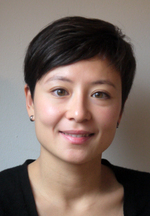 |
Eri Amsler is a new PhD student with the Paleoceanography and marine biogeochemistry group. She gained a MSc in Earth Sciences at ETH Zürich with a thesis on „Element distribution across different types of sedimentary contacts in the Nankai accretionary prisrn“. Her PhD project is part of the SNSF project “AmocCC – Constraining the relationship between climate, ACC flow intensity and Antarctic Meridional Overturning Circulation across the last glacial cycle“. |
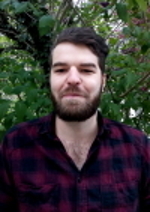 |
Marcel Bliedtner is a new PhD student with the Biogeochemistry and Paleoclimate group. He gained a MSc in Physical Geography at the University of Leipzig with a thesis on „Holocene paleovegetation reconstructed from a fluvial sediment-paleosol sequence along the upper Alazani River (Caucasus Region) using leaf-wax biomarkers – local vs. catchment information”. The title of his current research project is “Soil organic carbon and paleoclimate in Eurasia since the last ice age”. |
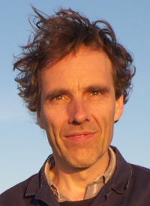 |
Georg Brun is a research fellow with the Philosophy of Climate Science and Climate group. He studied philosophy, linguistics and mathematics at the University of Zurich where he did his PhD. Before joining the University of Bern, he worked as a research fellow at the Institute for Environmental Decisions at ETH Zürich, among other positions. Currently, Georg Brun is mainly working on the project Reflective Equilibrium – Reconception and Application, funded by the SNSF. His interests in research and teaching include epistemology, philosophy and history of logic, argumentation theory, aesthetics, philosophy of language and philosophy of science. |
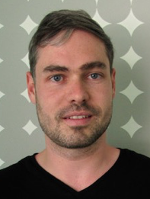 |
Mirco Brunner is a PhD student with the Prehistory Archeology group. He gained his Master’s in Archeology of Europe at the Institute of Archeological Sciences at the University of Bern. His PhD thesis is part of the SNFS project “Chronologie, Mobilität und Kulturtransfer am Beispiel einer inneralpinen Siedlungslandschaft. Eine landschaftsarchäologische Untersuchung des zentralen Alpenraums” |
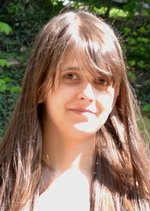 |
Céline Dizerens is a new PhD student with the Climatology Group. She gained her MSc at the Graduate School of Climate Sciences at the University of Bern with a thesis on "Georectification and snow classification of webcam images: potential for complementing satellite-derrived snow maps over Switzerland". The working title of her PhD project is “High-resolution snow line monitoring in the Swiss alpine area”. |
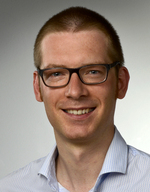 |
Raphael Felber is a new Postdoc with the Air Pollution/Climate group. His research interests are impacts of climate change on agriculture, agricultural pest modelling, greenhouse gases, eddy covariance flux measurements, methane and CO2 exchange over pastures. |
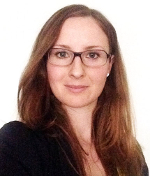 |
Caroline Heiz is a PhD student with the Prehistory Archeology group. She did a Lizenziat entitled „Abseits der grossen Seen. Die jungneolithischen Moorsiedlungen von Seedorf‐Lobsigesee (BE). Funde und Befunde der Sondiergrabungen von 2005 und 2007“ at the University of Basel. Her PhD thesis is called “Michelsberg, Munzingen, Cortaillod, Pfyn. Töpfereipraktiken, fremde Keramik und Mobilität in der Zürich- und Bodenseeregion (3900-3500 BC).“ |
| |
Martin Hinz is a Postdoc at the Prehistory Archeology group. |
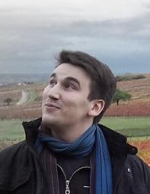 |
David Ginsbourger is a new Senior Researcher with the Mathematical and Applied Statistics group. His research interests are Gaussian processes, global optimization, machine learning, kernel methods, and computer experiments. |
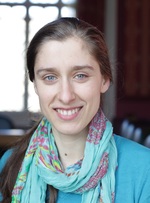 |
Julia Gottschalk is a new Postdoc in the Paleoceanography and Marine Biogeochemistry group. She did a PhD in Earth Sciences at the University of Cambridge (UK) on “The role of the Southern Ocean in millennial-scale atmospheric CO2 changes” and then worked as a Research Associate at the Godwin Laboratory for Palaeoclimate Research University of Cambridge. Her current Research interests are: Southern Ocean, global carbon cycle, foraminifera, ocean geochemistry, deep ocean oxygenation, Marine Isotope Stage 5. |
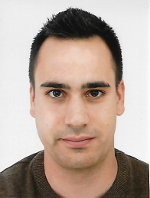 |
Lukas Heinzmann is a new PhD student with the Environmental History and Historical Climatology group. He did a Master of Arts in History and German Philology at the University of Bern with thesis entitled “Nutzung und Verbauung der Emme im Kanton Solothurn – Historische Aufarbeitung und Dokumentation (1500-2000)”. His dissertation is entitled "Entstehungsgeschichte und klimahistorische Auswertung des Einsiedler Kloster-Tagebuchs von Pater Joseph Dietrich, 1670-1704” and is closely linked to a project supported by the SNSF, which is “Das Klostertagebuch des Einsiedler Paters Joseph Dietrich, 1670-1704. Kommentierte Online-Edition”. |
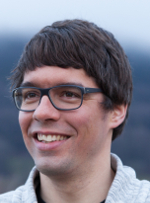 |
Pascal Horton joined the Hydrology group as a Postdoc. He did his PhD on “Improvements and global optimization of the analogue method for statistical precipitation forecasting” at the University of Lausanne in 2012. Prior to joining the OCCR, he provided expertise in natural hazards and software development for the geoscience community in a private company. He will now undertake research on hydrological extremes under climate change conditions in Switzerland. |
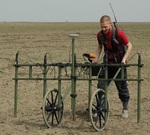 |
Julian Laabs is a PhD student with the Prehistory Archeology group. |
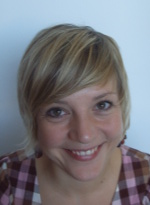 |
Florence Metz is a new Postdoc with the Environmental Policy Analysis group. She did a PhD in Policy Analysis at the University of Bern on „Do Policy Networks Matter to Explain Policy Design? A Comparison of Water Policy Networks and Water Protection Policies for the Reduction of Micropollutants in Four Rhine River Riparian Countries“. Before starting her new position with the OCCR, she spent some time at the OECD’s department for adaptation to climate change and will be co-operating with this institution in the future. By the way, Florence is the winner of the “2015 Dance your PhD”, Science's annual contest, which challenges scientists to explain their research through interpretive dance. |
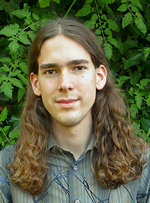 |
Patrik Pfister is a new PhD student with the Earth System Modeling – Atmosphere Ocean Dynamics group. He gained his MSc at the Graduate School of Climate Sciences at the University of Bern with a thesis entitled “Influence of Plate Tectonic Rearrangements on Climate”. |
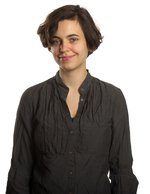 |
Tanja Rechnitzer is a PhD student with the Philosophy of Climate Science and Climate group. She works on a dissertation with the title “Justifying a Precautionary Principle for Climate Policies. A Case Study for Reflective Equilibrium”. Her dissertation is part of the project “Reflective Equilibrium - Reconception and Application”, funded by the SNFS. She holds a Master's Degree in European Studies (Europäische Kultur- und Ideengeschichte) from the Karlsruhe Institute of Technology. |
| |
Regine Stapfer is a PhD student with the Prehistory Archeology group. She did a Lizentiat on „Die Keramik der neolithischen Seeufersiedlung Sutz-Lattrigen Hauptstation innen“ at the University of Bern. Her dissertation project is entitled „Kontaktnetze und Mobilität neolithischer Gesellschaften im West- und Zentralschweizerischen Mittelland (3900-3500 v. Chr.)“ and carried out within the SNFS project „Mobilities, entanglements and transformations in Neolithic societies on the Swiss Plateau (3900-3500 BC)“. |
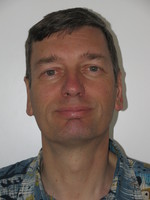 |
Othmar Wey is a Postdoc with the Prehistory Archeology group. He gained a master in prehistory, anthropology and archaeology of the middle Ages at the university of Zürich and did a PhD at the University of Bern. He then was head of a research team dealing with numerous excavations in Switzerland and Ecuador and he worked as “Oberassistent” at the Prehistory Departement of the Institute of Archaeological Science at the University of Bern. He is now head of the excavation team “Burgäschisee“ within the research project “Beyond lake settlements“. Othmar Wey’s research interest are: Neolithic, wetland sites, prehistoric settlement, climate events and climate evolution in relation to prehistoric societies, palaeoecology, field archaeology. |
A warm welcome to all of you!
Researchers who have recently left the OCCR:
Ivan Hernandez, who was a Postdoc with the Lake Sediments and Paleolimnology group, has gained a SNFS advanced mobility grant and is now at Marum Bremen, a research institution of the University of Bremen, Germany.
Päivi Rinta, who was a Postdoc with the Aquatic Paleoecology group, is now with the Hydrologic Basis Surface Water Section at the Federal Office for the Environment (FOEN).
Melanie Salvisberg, who was PhD student with the Environmental History and Historical Climatology group, is now a Postdoc with the same group.
Ansgar Schanz, who was a PhD student with the Atmospheric Radiometry and Processes, group, is now at AWK Group AG, Bern.
Sarina Steinmann, who was as PhD student with the Environmental and Climate Economics group, is now with Ecoplan AG, Bern.
Martin Wegmann, who was as PhD student at the Climatology group, is now a Postdoc at the Laboratory for Glaciology, Geophysics and Environment at the University Joseph Fourier in Grenoble, France.
All the best for your future career!